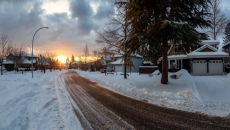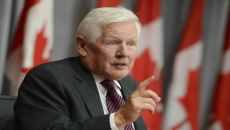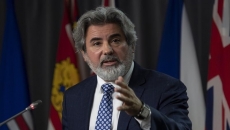The COVID-19 case count continues to climb at an alarming pace west of the Maritimes, despite tighter restrictions as some jurisdictions get ready for more drastic measures.
Total cases hit 304,477 across the country, according to numbers reported as of midday Tuesday, more than half of those cases having come in the past four months. The death toll now stands at 11,063, according to figures from provincial health authorities.
Chief public health officer Dr. Theresa Tam highlighted "promising" early results from two vaccine trials by Pfizer and Moderna. But Prime Minister Justin Trudeau stressed the country remains in an "incredibly serious" situation where Canadians will need to refocus their efforts until vaccines become widely available.
"We still have to get through the next month and the month after that before vaccines arrive," Trudeau said Tuesday in Ottawa.
We’ll continue to do whatever it takes, for as long as it takes, to keep you safe from COVID-19. But we need you to do your part, too. Watch our Tuesday update for the latest on our response to the pandemic, how you can help, and more: https://t.co/UNb7P7amcE
— Justin Trudeau (@JustinTrudeau) November 17, 2020
He said the military could "potentially" play a role in delivering millions of vaccine doses to provincial hubs, but once again brushed off the possibility of invoking the Emergencies Act to help clamp down on the spread of the novel coronavirus.
"I don’t think we’re there yet. I hope we won’t and I don’t think we will," Trudeau said in French.
The number of patients with severe illness due to COVID-19 is surging, with those over 80 years old having the highest incidence rate, Tam said.
2/2 Over the past week, an average of 58,408 people have been tested for #COVID19 daily across Canada, with 6.6% of these people testing positive as #publichealth continues to expand #TestandTrace capacity to meet increased demands. https://t.co/ZArmpJMAM3
— Dr. Theresa Tam (@CPHO_Canada) November 17, 2020
Public health authorities are warning of a steep rise in demand for hospital beds and intensive-care treatment in the days ahead based on recent record-breaking case numbers.
New cases exceeded 1,000 for the 12th consecutive day in Ontario, which reported 1,249 new cases Tuesday and 12 new deaths due to the illness.
Toronto alone saw 569 new cases — its highest ever daily tally — while Peel Region had 256.
Nunavut is the latest jurisdiction to announce strict new measures, as the territory prepares to enter a partial lockdown.
It has logged 26 cases since the first one was reported Nov. 6, prompting the government to close all schools, indoor dining and non-essential businesses for at least two weeks starting Wednesday.
Manitoba, which brought in similar measures last week, is upping its enforcement game, hiring a private security firm to help hand out fines for infractions such as gathering in groups of more than five people.
The company G4S Canada will provide more than 90 people to enforce COVID-19 restrictions, Premier Brian Pallister said Tuesday.
Quebec reported 982 new cases of COVID-19 Tuesday and 24 more deaths attributed to the virus. Health authorities said hospitalizations jumped by 47 compared with the prior day, to 638.
“Maybe next summer we could go back to a life that is just about normal,” Quebec Premier François Legault said in French.
Alberta suffered its deadliest day of the pandemic earlier this week, reporting Monday that 20 people in the province had died from COVID-19 the day before.
Trudeau said all Canadians should avoid international travel, even as some remain set on heading south for the winter.
The pandemic is resurgent across large swaths of the United States, saying Canadians are safest at home.
However, he says the choice is in the hands of individuals, and suggests those who do make the trip get comprehensive health and travel insurance and make sure that regional health-care facilities are not overwhelmed.


.jpg)



